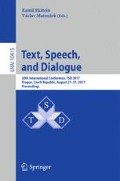Abstract
There are different metrics which are used in call centres or Spoken Dialogue Systems (SDSs) as an indicator for problem detection during the dialogue. One of such metrics is emotional state. The measurements of emotions can be a powerful indicator in different task-oriented services. Besides emotional state, there is another widely used metric: customer satisfaction (CS), which has a modification called Interaction Quality (IQ). The both models of CS and IQ may include emotional state as a feature. However, is it an actually necessary feature? Some users/customers can be very emotional, while other can be insufficiently emotional in different satisfaction categories. That is why emotional state may be not an informative feature for IQ/CS modelling. Our research is dedicated to the definition of the emotions measurements role in IQ modelling task.
Access this chapter
Tax calculation will be finalised at checkout
Purchases are for personal use only
Notes
References
Abdi, H., Williams, L.J.: Principal component analysis. WIREs Comput. Stat. 2, 433–459 (2010)
Bailey, R.A.: Design of Comparative Experiments. Cambridge University Press, Cambridge (2008)
le Cessie, S., Houwelingen, J.C.: Ridge estimators in logistic regression. Appl. Stat. 41(1), 191–201 (1992)
Cristianini, N., Shawe-Taylor, J.: An Introduction to Support Vector Machines and Other Kernel-based Learning Methods. Cambridge University Press, New York (2000)
Eyben, F., Weninger, F., Gross, F., Schuller, B.: Recent developments in opensmile, the Munich open-source multimedia feature extractor. In: Proceedings of ACM Multimedia (MM), pp. 835–838 (2013)
Gholap, J.: Performance tuning of J48 algorithm for prediction of soil fertility. Asian J. Comput. Sci. Inf. Technol. 2(8), 251–252 (2012)
Goutte, C., Gaussier, E.: A probabilistic interpretation of precision, recall and F-Score, with implication for evaluation. In: Losada, D.E., Fernández-Luna, J.M. (eds.) ECIR 2005. LNCS, vol. 3408, pp. 345–359. Springer, Heidelberg (2005). doi:10.1007/978-3-540-31865-1_25
Hall, M., Frank, E., Holmes, G., Pfahringer, B., Reutmann, P., Witten, I.H.: The WEKA data mining software: an update. SIGKDD Explor. 11(1), 10–18 (2009)
John, G.H., Langley, P.: Estimating continuous distribution in Bayesian classifiers. In: Eleventh Conference on Uncertainty in Artificial Intelligence, pp. 338–345 (1995)
Kennedy, J.J., Bush, A.J.: An Introduction to the Design and Analysis of Experiments in Behavioural Research. University Press of America, Lanham (1985)
Maar, B., Neely, A.: Managing and Measuring for Value: the Case of Call Centre Performance. Cranfield School of Management, cranfield (2004)
Park, Y., Gates, S.C.: Towards real-time measurement of customer satisfaction using automatically generated call transcripts. In: Proceedings of the 18th ACM conference on Information and knowledge management, pp. 1387–1396 (2009)
Platt, J.: Fast training of support vector machines using sequential minimal optimization. In: Schoelkopf, B., Burges, C., Smola, A. (eds.) Advances in Kernel Methods: Support Vector Learning. MIT Press, Cambridge (1999)
Quinkan, J.R.: C4.5: Programs for Machime Learning. Morgan Kaufmann Publishers, San Francisco (1993)
Rosenberg, A.: Classifying skewed data: importance to optimize average recall. In: Proceedings of INTERSPEECH 2012, pp. 2242–2245 (2012)
Rosenblatt, F.: Principles of Neurodynamics Perceptrons and the Theory of Brain Mechanisms. Spartan Books, Washingtion DC (1961)
Schmitt, A., Schatz, B., Minker, W.: Modeling and predicting quality in spoken human-computer interaction. In: Proceedings of the SIGDIAL 2011 Conference, pp. 173–184. Association for Computational Linguistics (2011)
Schmitt, A., Ultes, S.: Interaction quality: assessing the quality of ongoing spoken dialog interaction by experts - and how it relates to user satisfaction. Speech Commun. 74, 12–36 (2015)
Schmitt, A., Ultes, S., Minker, W.: A parameterized and annotated corpus of the CMU let’s go bus information system. In: International Conference on Language Resources and Evaluation (LREC), pp. 3369–3373 (2012)
Schuller, B., Steidl, S., Batliner, A.: The interspeech 2009 emotion challenge. In: Proceedings of INTERSPEECH 2009, pp. 312–315 (2009)
Sidorov, M., Brester, C., Schmitt, A.: Contemporary stochastic feature selection algorithms for speech-based emotion recognition. In: Proceedings of INTERSPEECH 2015, pp. 2699–2703 (2015)
Spirina, A., Sidorov, M., Sergienko, R., Schmitt, A.: First experiments on interaction quality modelling for human-human conversation. In: Proceedings of the 13th International Conference on Informatics in Control, Automation and Robotics (ICINCO), vol. 2, pp. 374–380 (2016)
Spirina, A., Vaskovskaia, O., Sidorov, M., Schmitt, A.: Interaction quality as a human-human task-oriented conversation performance. In: Ronzhin, A., Potapova, R., Németh, G. (eds.) SPECOM 2016. LNCS (LNAI), vol. 9811, pp. 403–410. Springer, Cham (2016). doi:10.1007/978-3-319-43958-7_48
Spirina, A.V., Sidorov, M.Y., Sergienko, R.B., Semenkin, E.S., Minker, W.: Human-human task-oriented conversations corpus for interaction quality modelling. Vestnik SibSAU 17(1), 84–90 (2016)
Ultes, S., Platero Sánchez, M.J., Schmitt, A., Minker, W.: Analysis of an extended interaction quality corpus. In: Lee, G.G., Kim, H.K., Jeong, M., Kim, J.-H. (eds.) Natural Language Dialog Systems and Intelligent Assistants, pp. 41–52. Springer, Cham (2015)
Vapnik, V.N.: The Nature of Statistical Learning Theory. Springer, New York (1995)
Wang, J.: From customer satisfaction to emotions: alternative framework to understand customer’s post-consumption behaviour. In: Proceedings of the 2012 International Joint Conference on Service Sciences, pp. 120–124 (2012)
Wilcoxon, F.: Individual comparisons by ranking methods. Biom. Bull. 1, 80–83 (1945)
Witten, I.H., Frank, E., Hall, M.A.: Data Mining: Practical Machine Learning Tools and Techniques. Morgan Kaufmann, San Francisco (2011)
Acknowledgments
The work presented in this paper was partially supported by the DAAD (German Academic Exchange Service), the Ministry of Education and Science of Russian Federation within project 28.697.2016/2.2, and the Transregional Collaborative Research Centre SFB/TRR 62 “Companion-Technology for Cognitive Technical Systems” which is funded by the German Research Foundation (DFG).
Author information
Authors and Affiliations
Corresponding author
Editor information
Editors and Affiliations
Rights and permissions
Copyright information
© 2017 Springer International Publishing AG
About this paper
Cite this paper
Spirina, A., Minker, W., Sidorov, M. (2017). Could Emotions Be Beneficial for Interaction Quality Modelling in Human-Human Conversations?. In: Ekštein, K., Matoušek, V. (eds) Text, Speech, and Dialogue. TSD 2017. Lecture Notes in Computer Science(), vol 10415. Springer, Cham. https://doi.org/10.1007/978-3-319-64206-2_50
Download citation
DOI: https://doi.org/10.1007/978-3-319-64206-2_50
Published:
Publisher Name: Springer, Cham
Print ISBN: 978-3-319-64205-5
Online ISBN: 978-3-319-64206-2
eBook Packages: Computer ScienceComputer Science (R0)

